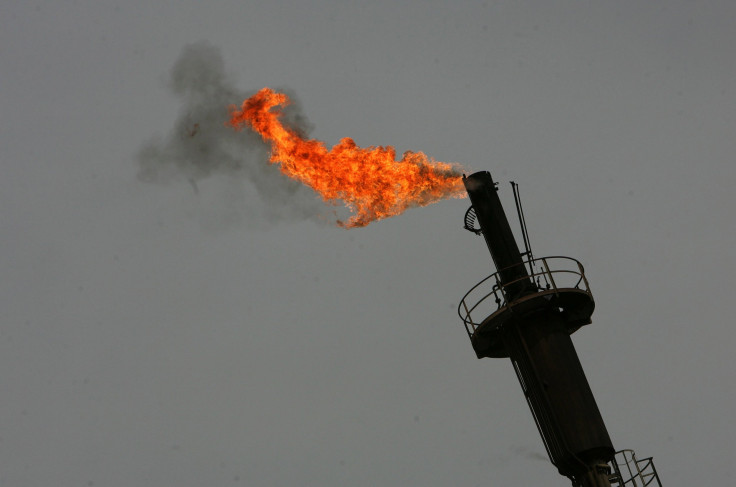Oil Prices 2016: Saudi Arabia, Iran Rivalry Fuels Grim Outlook Amid Slow China Economy, US Export Ban's End

Ahead of the new year, the price of oil continues to trade well below last year's rates, thanks in part to Saudi Arabia's oversaturation of the market, which sent prices plummeting in 2015. But if you were thinking that downward trend for barrels of black gold can't possibly be sustained over the next 12 months, think again.
Oil has become a destructive and potent weapon in the complex geopolitics of the Middle East, and one being wielded without mercy by Saudi Arabia against its regional rival, Iran. The oil-producing superpower has intentionally flooded the market to ensure that Iran, which is ramping up its own oil production ahead of economic sanctions being lifted, benefits as little as possible. Combined with a slowdown in Chinese demand for oil and the end of a U.S. export ban of the valuable commodity, another torrid year for oil is likely looming, energy analysts and experts said.
“The Saudi policy of keeping the spigots open and keeping production up is really just for geopolitical reasons, despite the damage to its economy,” said Ariel Cohen, a senior fellow with expertise in global energy at the Atlantic Council, a Washington think tank. “The center of their thinking is about efforts to constrain Iran, and the dynamic that is driving that Saudi oil policy is the sectarian rivalry between the Sunni Saudis and the largely Shia Iranians.”
Iran and Saudi Arabia at odds over output as #oil prices collapse. https://t.co/CJGR3Yqh6v pic.twitter.com/KJctpxxxUS
— Holger Zschaepitz (@Schuldensuehner) December 8, 2015Punitive Saudi Arabia
No idiom could better describe Saudi Arabia’s actions against Iran than “cutting off one’s nose to spite one’s face,” because punishing Iran will also hurt Saudi Arabia’s economy, as well as many other countries that count oil as their primary export.
Saudi Arabia has steadily increased oil production above 10 million barrels per day since January, breaking the records for daily levels over the last decade and pushing the value of oil down to nearly the 2004 rate of less than $25 a barrel. In summer 2014, oil exceeded $100 a barrel, but it is now trading well below $40, according to data from OPEC, a group of oil-producing nations that operates like a cartel, dictating oil output in order to control prices. But over the last year, OPEC has let countries independently control their respective output, which has caused prices to fall.
In spite of the departure from traditional oil-regulating procedures, Russia's energy minister said Monday that the blame for the world's low oil prices lies squarely with Saudi Arabia. "Saudi Arabia has this year increased production by 1.5 million barrels per day, thus effectively destabilizing the situation on the market," Alexander Novak, was quoted as saying Monday. Russia's economy has historically been pegged to a much higher price per oil barrel before it was devastated by much cheaper costs over the last year, dramatically dropping Russia's spending power.
With Brent oil plunging Iran, Iraq, Venezuela and Saudi Arabia will have a hard time balancing their books pic.twitter.com/YLbMFmjX38
— Supertrader (@Buallianz) December 21, 2015Even though Saudi Arabia controls its own fate and that of other countries with a heavy economic reliance on oil, the low price means it must depend on its vast financial reserves -- as well as reduce its national budget, which it did Monday. Saudi officials said the government was running a record deficit of nearly 367 billion Saudi riyals ($98 billion) in 2015, around 15 percent of GDP, as low oil prices slashed revenue, forcing budget planners to cut spending by 14 percent for 2016. Of the 10 million barrels pumped each day, 7 million is exported. Of the revenue made from oil exports, about 90 percent goes toward the government’s fiscal revenue and is also responsible for 40 percent of the country’s overall GDP.
But for Saudi Arabia, the damage it will sustain is worth it, so long as Iran’s post-sanctions plans are hampered.
"The Saudis' best weapon is the lowest oil price at maximum volume. They have enough financial reserves to have staying power for years," David Kotok, chief investment officer at Cumberland Advisors, told CNN Money.
Although Iran is not getting the same value for its oil as last year, Tehran is pushing up its production and wants to increase exports as sanctions against it are removed, which could happen as early as next month. The National Iranian Oil Company reported it would scale up production by 500,000 barrels per day from its current production of around 3.3 million barrels a day within the week after the sanctions are lifted. While the increased production will bring in much-needed revenue, it would still be far below what Tehran was expecting a little more than a year ago when prices were at $100 per barrel.
#Oil price forecasts keep falling, @WSJ graphic shows
#OPEC #shale #SaudiArabia #Iraq #Iran #NorthDakota #Libya pic.twitter.com/DjyBUs7F25
— Christopher Johnson (@chris1reuters) December 14, 2015U.S. Export Ban Lifted
The U.S. government’s plan to do away with a 40-year-old domestic oil export ban will also contribute to the global market's oversaturation, but prices are unlikely to lower drastically. While the new legislation lifts oil exports, it will affect only oil coming out of North Dakota, economic analysts said.
“Historically, oil prices are not low, actually,” said Keith Crane, senior economist at the Rand Corporation, a Washington, D.C., think tank. “But the export ban being lifted in the U.S. will really only have a modest impact on the market, and in the grand scheme of things oil coming from North Dakota only accounts for about 1.5 percent of the global total.”

Andrew Lipow, president of Lipow Oil Associates in Houston, expressed a similar sentiment, pointing out that "this is a small thing compared to Iran coming back to the market with a million barrels a day.”
Slowdown in China
China is one of the world’s biggest importers of crude oil, so the Chinese economic slowdown will also have a major effect on global oil prices. China's economy has slowed in part because of a shift from manufacturing and exports to a system that is more consumer-driven, like the United States.
China’s National Bureau of Statistics reported Monday that the country's industrial profits fell by $103.8 billion in November compared to the same period in 2014. It was the sixth straight month of decline, signaling a continued Chinese economic slowdown in 2016, according to a new report. As a result, China’s reliance on crude oil has lessened greatly, which is likely to negatively affect the demand for crude oil and affect oil prices, the report added.
“The Chinese slowdown will absolutely be crucial in 2016 for oil as the country shifts gradually from a manufacturing nation to a consumer-based economy,” said the Atlantic Council’s Cohen. “As long as China was consuming the amount oil it had [previously] done, and continued with economic growth, there was a secure market to sell to and oil would have been bought at the same rate. However, China’s economy is slowing down and so is the consumption of oil there.”
#FT https://t.co/hAGbIbeIRt RT RobinKwong: Where China pivoted its #oil buying away from: #Saudi Arabia, Iran, Li… pic.twitter.com/LE70tFBrxB
— Money News 24h (@MoneyNews24h) December 3, 2015Although there is a high potential for a grim outlook in 2016, some claim the price of oil will rebound in the long term. A market note Tuesday from equity analyst David Meats suggested that oil could eventually rebound to $70 a barrel, but the Atlantic Council’s Cohen said the long-term price will likely be far lower and deeply damaging to many oil-dependent economies.
“I think in today’s conditions, where $34 is being referred to as the bottom, projections from the International Energy Agency in Paris that $50 will be a high up to 2020 will be bad news for economies like Russia, Venezuela and Iran," Cohen said. "These guys have to go on a strict diet in term of their budgets or they could suffer."
© Copyright IBTimes 2025. All rights reserved.






















